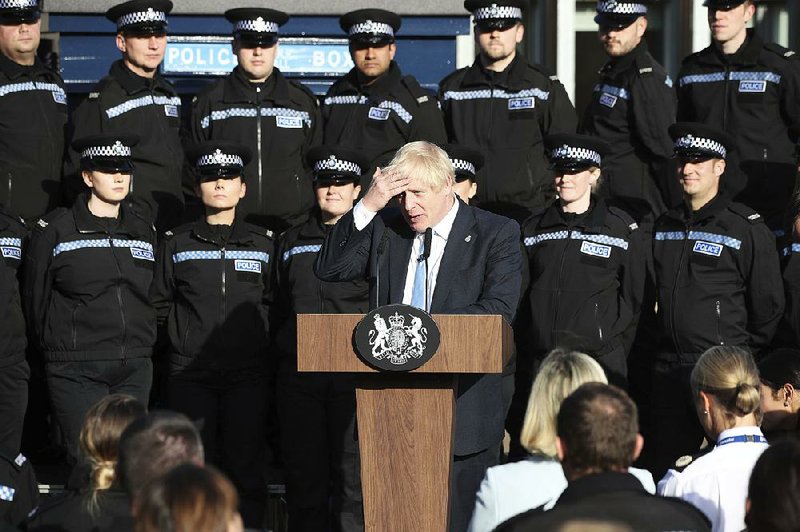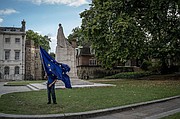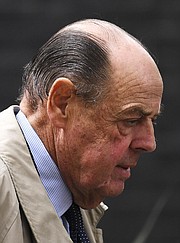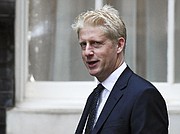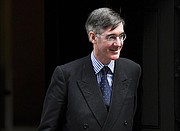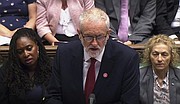LONDON -- As a law to prevent a no-deal Brexit hurtled toward passage Thursday, British lawmakers began drawing the battle lines for their next fight: when to hold a general election that is now inevitable.
Opposition lawmakers have so far blocked Prime Minister Boris Johnson's plan for a mid-October election, but the government said Thursday that it would hold another parliamentary vote Monday on an early election.
That set up a clash over when British voters will get to decide who should handle Britain's departure from the European Union, with opposition Labor Party lawmakers haggling over what stage of the Brexit process gives them the best chance of wrenching control from Johnson's enfeebled government.
Johnson sees an election as the only way to create a stable majority for his Conservative Party in Parliament and secure a mandate for pulling Britain out of the European Union by Oct. 31, with or without a deal governing future relations.
"I don't want an election at all, but frankly I cannot see any other way," he said Thursday during a speech in northern England promoting a plan to hire more police officers. "The only way to get this thing moving is to make that decision."
To keep alive the possibility of pulling Britain out of the European Union by Oct. 31, Johnson wants to hold the election as quickly as possible. But opposition lawmakers are reluctant to let him schedule the election on his terms. Some of them reason that postponing a vote until November would force Johnson to abide by a law blocking a no-deal Brexit and to ask Brussels for a delay, thereby breaking the central promise of his tenure.
Johnson said Thursday that he "would rather be dead in a ditch" than ask for that delay.
Johnson lost his governing majority this week through departures of party members and his decision to expel from the party more than 20 lawmakers who voted against him in Parliament.
One of those purged was Nicholas Soames, 71, the grandson of Winston Churchill. He told the Guardian on Thursday that many Conservative lawmakers agreed with his defiance of Johnson's no-deal Brexit threat; he said he had received more than 500 emails from people thanking him.
"In a debate in the House in 1938, Chamberlain accused my grandfather of undermining his negotiations with the Germans," he said, referring to Neville Chamberlain, the prime minister at the time. "I think history will prove my grandpapa to be right under the circumstances. And I think I will prove to be right."
Members of the Conservative Party on Thursday were calling for the reinstatement of the excommunicated lawmakers.
In a speech in Glasgow, former Prime Minister John Major said that "without them -- and others like them -- we will cease to be a broad-based national party, and be seen as a mean-minded sect." He said the government's behavior in recent days was something "I never thought to see from any British government, and it must stop."
Also Thursday, Johnson's younger brother, Jo Johnson, quit the government, saying he could no longer endure the conflict "between family loyalty and the national interest."
Jo Johnson, who was a business minister in his brother's government, voted against Brexit in the 2016 referendum.
"Jo doesn't agree with me about the European Union. It's an issue that divides families and divides everybody," Boris Johnson said in Yorkshire, calling his brother a "fantastic guy" and noting he supported the government's efforts to increase spending on education, hospitals and public safety.
Asked why people should trust him to act in the national interest when his brother doesn't, the prime minister said: "People disagree about the EU, but the way to unite the country, I'm afraid, is to get this thing done. That is the reality. The longer this goes on, the more dither and delay we have from Parliament ... the worse this thing will be."
DEADLINES, ELECTIONS
Jacob Rees-Mogg, the leader of the House of Commons, said Thursday that Parliament would hold the vote Monday on an early election. That is the same day the bill stopping a no-deal Brexit is expected to receive royal assent and become law.
The early-election vote, requiring two-thirds of lawmakers to pass, will once again depend on the support of opposition lawmakers, and Thursday it remained unclear what side they would take.
Jeremy Corbyn, leader of the opposition Labor Party, has said repeatedly that he will not agree to an election until a law stopping a no-deal Brexit is on the books. That way, Johnson would be denied the wiggle room to potentially schedule an election after Oct. 31 and let Britain crash out of the European Union without a deal.
Labor Party economy spokesman John McDonnell said Thursday that the party wanted an election but was still deciding on whether to seek one before the Brexit deadline, or to wait until Parliament had secured a delay to Britain's departure from the bloc.
"The problem that we have got is that we cannot at the moment have any confidence in Boris Johnson abiding by any commitment or deal that we could construct," he told the BBC. "That's the truth of it. So, we are now consulting about whether it's better to go long, therefore, rather than to go short."
Opposition lawmakers in favor of the bill stopping a no-deal Brexit had feared that the House of Lords, an unelected body that acts as the upper house of Parliament, could filibuster its passage. But after hours of debate, allies of Johnson in the House of Lords relented early Thursday, allowing the bill to advance through the chamber by the end of the week.
Johnson plans to suspend Parliament at some point next week until Oct. 14, a decision that has angered opponents of Brexit and faces several legal challenges. His critics accused him of subverting democracy and carrying out a "coup."
Transparency campaigner Gina Miller, who won a 2017 Supreme Court ruling that stopped the government from triggering the countdown to Brexit without a vote in Parliament, took the government to the High Court on Thursday over the suspension.
Miller, who is supported in her claim by the Labor Party and the governments of Scotland and Wales, argues that sending lawmakers home at a crucial time is unlawful.
"We say that what the prime minister is not entitled to do is to close Parliament for five weeks at such a critical time without justification," her lawyer, David Pannick, said at the hearing.
The case continues today, when judges may give their ruling.
Johnson insists he wants to secure a revised divorce deal to replace the agreement his predecessor Theresa May struck with the bloc, which was rejected three times by lawmakers. He told Parliament this week that there was "real momentum" in negotiations with the EU, but European officials deny this and say Britain has yet to produce any concrete proposals.
Pro-Brexit politicians want a looser economic relationship with the EU than foreseen under May's deal, to make it easier to strike new trade pacts with other countries, notably the United States.
U.S. Vice President Mike Pence met Johnson in London on Thursday and later tweeted: "As the deadline for Brexit approaches, we urge the European Union to negotiate in good faith with Prime Minister Boris Johnson and work to reach an agreement that respects the United Kingdom's sovereignty and minimizes disruption to commerce."
At the meeting, Pence said Washington "is ready, willing and able to immediately negotiate a free-trade agreement with the U.K."
EU officials say that although they are keen to avoid the chaos of a no-deal Brexit, they are unwilling to compromise on their demand for guarantees that the Irish border remain open.
But they also said that EU leaders had no plans to push Britain out of the European Union against its will, and that if Johnson asked to delay his country's exit date to hold a general election, he would almost certainly be granted the reprieve.
Information for this article was contributed by Benjamin Mueller of The New York Times; by Jill Lawless, Gregory Katz, Jill Colvin and Lorne Cook of The Associated Press; and by Kevin Sullivan, Karla Adam, Robert Costa, and Laura Hughes of The Washington Post.
A Section on 09/06/2019
